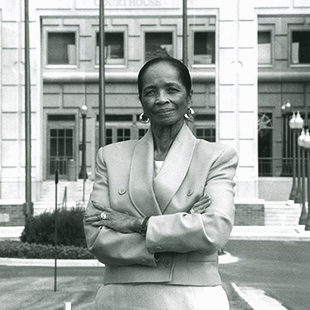Request Information
Ready to find out what MSU Denver can do for you? We’ve got you covered.
 Edna Mosley often called herself a “fugitive from injustice” and told this story by way of explanation:
Edna Mosley often called herself a “fugitive from injustice” and told this story by way of explanation:
It was 1954. Mosley, a 29-year-old black woman, Denver resident, and mother of two young children, had been visiting relatives in Helena, Arkansas, and it was the family’s day to travel home to Denver by train.
“She wore a yellow sundress with a matching yellow parasol, white gloves and an alligator handbag,” said her grandson, John Futrell (B.F.A. painting ’99 and B.A. African American Studies ’00), recounting the story as his grandmother told it. “Her children — my mother and uncle — were also dressed to the T, starched with shiny shoes.”
Standing on the train platform, Mosley was approached by a white man who asked them to leave the platform.
“My grandmother said, ‘I paid for my ticket. My children have their tickets. I’m not moving.’”
Mosley spent that night in jail. The next morning, after her grandfather had posted her bail, she emerged in that pretty sundress, boarded a train bound for Denver with her children, and never returned to Arkansas. She missed her bail hearing and became a “fugitive.”
Mosley, who died Aug. 26, 2014, was part of MSU Denver’s first graduating class in 1969. She was also one of the University’s first nontraditional students: 44 years old, a mother and a career woman.
Mosley was a civil-rights leader who left an incredible legacy in Colorado through her fight for equality. Among her achievements: She was the first black city council member in Aurora, elected in 1991, and she was a founder of The Women’s Bank (now Colorado Business Bank), championing the rights of women to achieve financial freedom.
Denver Mayor Michael Hancock knew Mosley well. “Edna was one of the most gentle but firm personalities I have ever known. She was very loving but didn’t let you get away with anything. She was as beautiful a spirit as anyone I have ever been around.”
Likewise, Mosley’s friend donnie betts (B.A. speech communication ’87) said, “She was gentle. When necessary, she was forcefully gentle. It was like she was saying, ‘I know my ground and I will stick firmly on the ground for which I stand but I will treat you with respect. And I expect the same from you. This is how we can solve any differences we have: with respect.’”
Futrell, who says he attended MSU Denver because of Mosley’s love for the school, simply said this of his grandmother: “She was the best human I have ever known.”